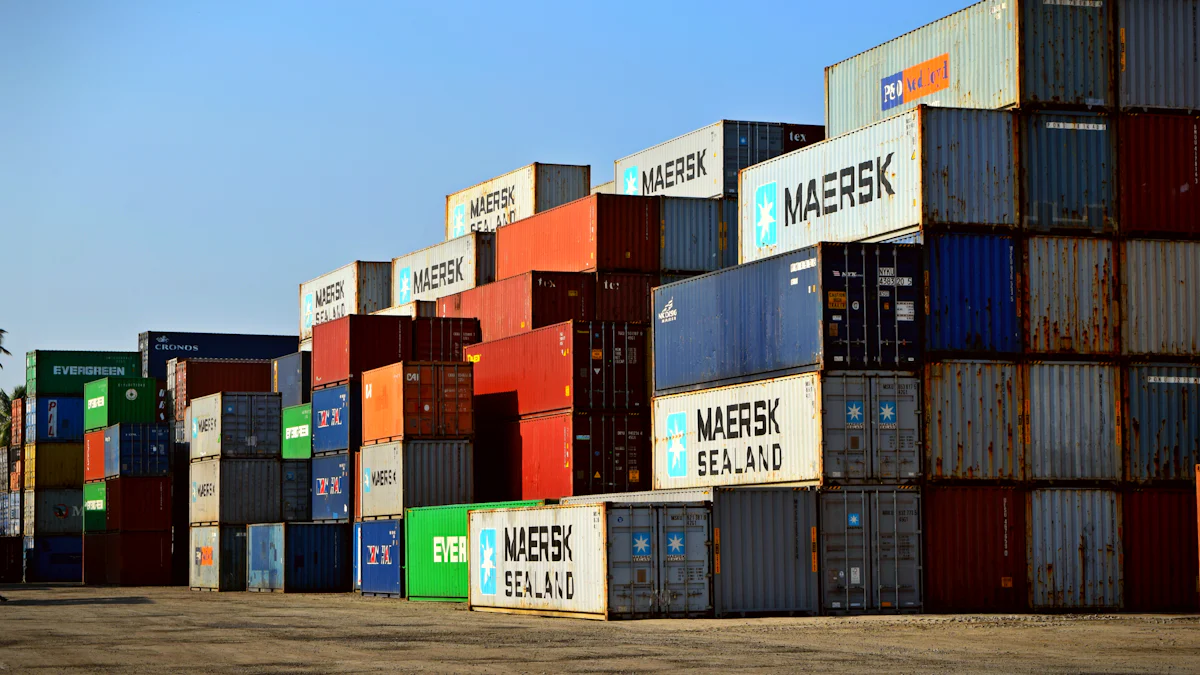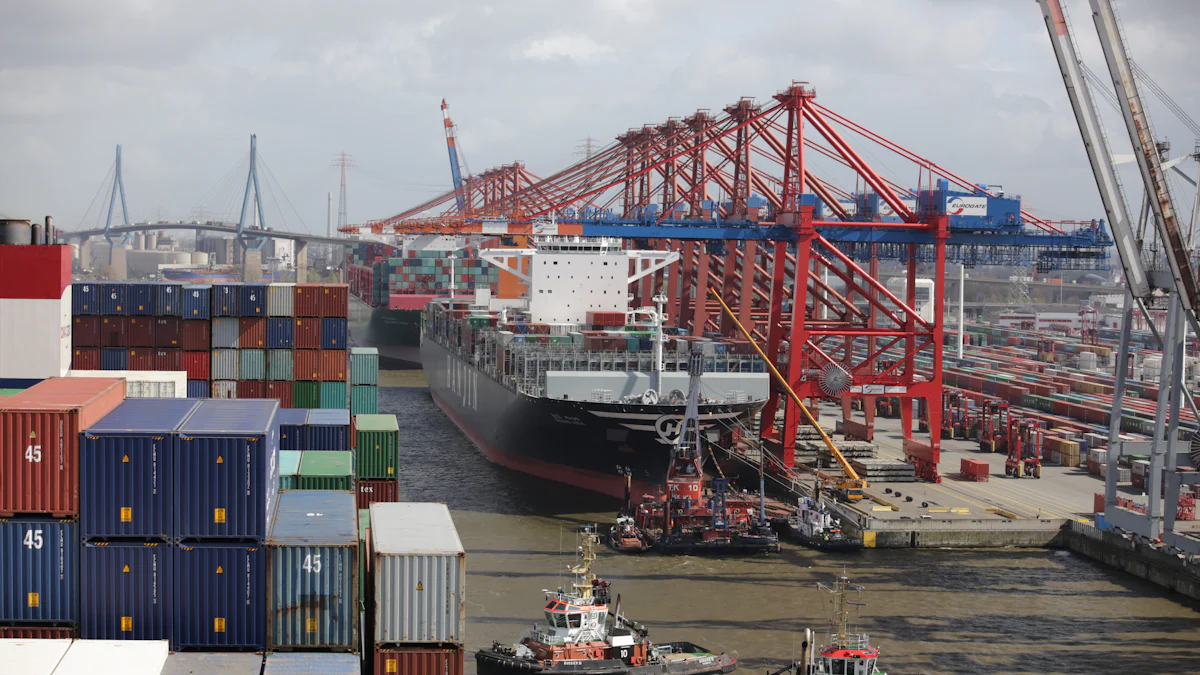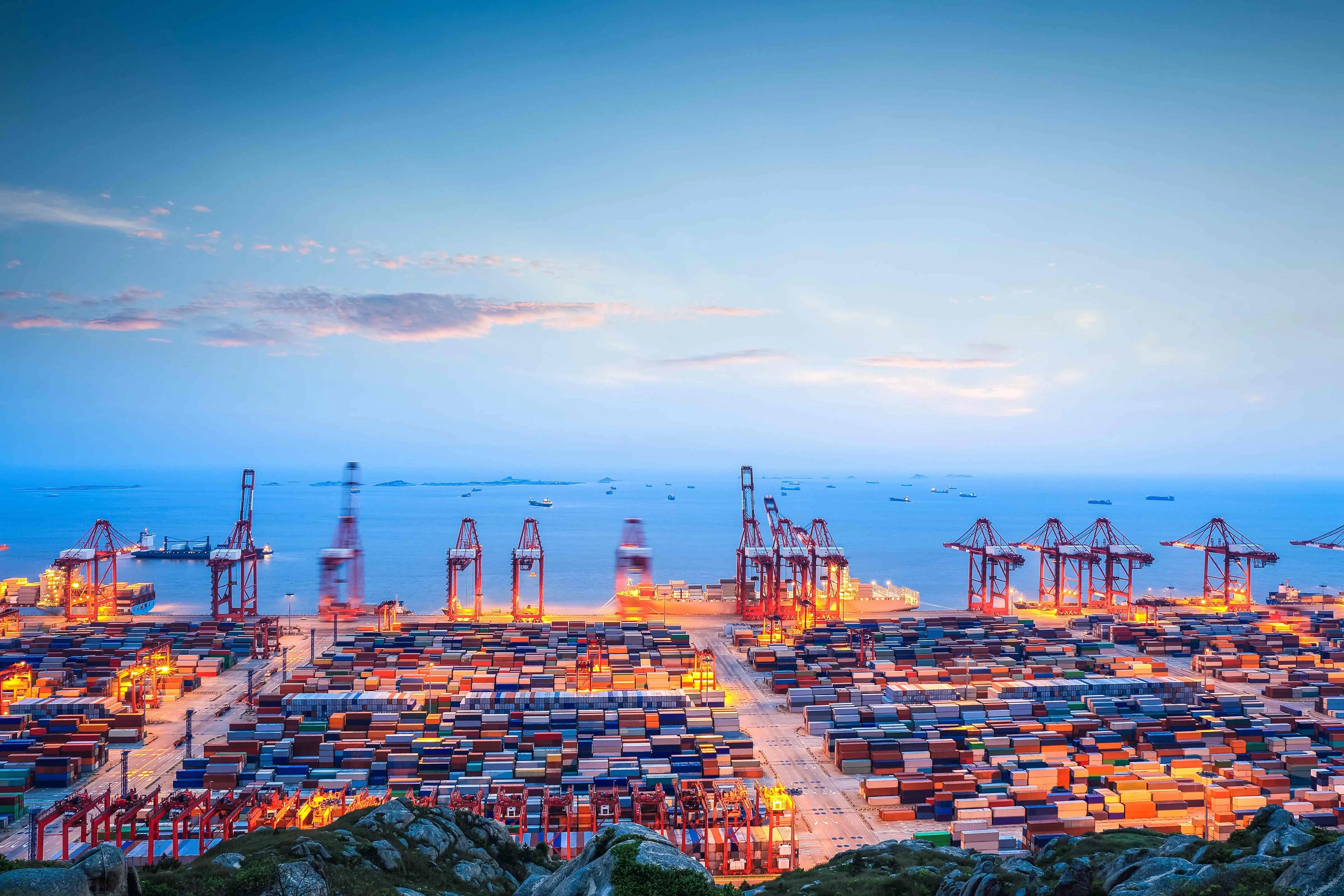How the Logistics Industry Impacts Global Trade

The logistics industry drives global trade by connecting businesses and markets worldwide. Innovations like digital twins, blockchain, and IoT have revolutionized operations. JUSDA’s China-Europe Express Rail exemplifies this transformation, offering faster, cost-effective solutions. These advancements optimize the supply chain, ensuring efficiency and reliability in an increasingly interconnected world.
Key Takeaways
The logistics industry makes over USD 4.3 trillion each year. It is very important for global trade and economic growth.
New technologies like AI, blockchain, and IoT make supply chains better. They lower costs and make systems more reliable.
Green logistics, like smart route planning and electric vehicles, cut pollution. They also make operations work better.
The Role of the Logistics Industry in Global Trade

Facilitating Cross-Border Trade and Economic Growth
The logistics industry plays a vital role in connecting global markets. It generates over USD 4.3 trillion annually, making it a cornerstone of international commerce. By improving logistics performance, businesses can reduce costs and enhance market access. This is especially impactful in low-income countries, where better logistics can boost trade by up to 15 percent. Efficient logistics systems also create jobs and stimulate economic growth. For example, in Abu Dhabi, the logistics sector contributes 10.2% to GDP and employs over 100,000 people. Ports in the region handle over 20 million tons of cargo, showcasing the industry's ability to facilitate trade and improve competitiveness.
Region | GDP Contribution | Employment Figures | Trade Facilitation | Logistics Performance Index |
|---|---|---|---|---|
Ghana | Significant | Direct and indirect jobs | Infrastructure investment | Various metrics available |
Abu Dhabi | 10.2% of GDP | Over 100,000 employed | Ports handle 20M+ tons of cargo | Improved productivity |
Enhancing Supply Chain Efficiency and Reliability
You can achieve greater efficiency and reliability in your supply chain by leveraging modern logistics solutions. Key factors include increasing visibility, automating processes, and using integrated software. JUSDA’s advanced digital tools, such as real-time tracking and dynamic inventory management, ensure seamless operations. These technologies allow you to address potential issues proactively, reducing delays and improving reliability. Companies like DHL have also adopted innovations like augmented reality, boosting picking efficiency by 25%. Similarly, platforms like TradeLens use blockchain to enhance transparency, ensuring smoother supply chain operations.
Supporting Market Expansion Through Integrated Solutions
Integrated logistics solutions are essential for businesses aiming to enter new markets. These solutions manage every stage of the supply chain, from procurement to delivery, ensuring smooth operations. They also provide local expertise, helping you navigate unique challenges in unfamiliar regions. For small and medium-sized enterprises (SMEs), integrated solutions offer cost savings, scalability, and access to advanced technology. By outsourcing logistics to third-party providers, SMEs can focus on their core activities while improving customer satisfaction. This flexibility allows businesses to adapt quickly to market disruptions and seize new opportunities.
Key Trends Shaping the Logistics Industry
Automation and Robotics in Logistics Operations
Automation and robotics are transforming logistics operations, making them faster and more efficient. You can see this in smart warehouses, where robots autonomously manage inventory and optimize tasks using AI. For example, JD.com uses robots to enhance scalability and responsiveness. Similarly, Amazon employs Kiva robots in fulfillment centers, reducing order processing time and labor costs. These advancements demonstrate how robotics streamline operations and improve productivity.
Emerging trends in robotics include Autonomous Mobile Robots (AMRs) that enhance flexibility in warehouses and Collaborative Robots (Cobots) that work alongside humans to boost efficiency. Machine learning also plays a key role by optimizing inventory management and decision-making. By adopting these technologies, you can reduce errors, lower costs, and handle peak demand without hiring additional staff. Continuous operation of robots ensures higher throughput, making them a financially sound investment for logistics companies.
Digitalization and Smart Supply Chain Solutions
Digitalization is reshaping the logistics industry by integrating smart technologies into supply chain operations. Tools like blockchain and IoT improve transparency and data collection, while AI automates warehouse processes and enhances delivery times. Wearable computing and big data analytics also provide real-time insights, helping you make better decisions.
Smart supply chain solutions offer several benefits. They enhance efficiency, improve accuracy, and increase customer satisfaction. By adopting these technologies, you gain a competitive edge and unlock opportunities for innovation. For instance, blockchain ensures transparency in track-and-trace applications, while IoT connects devices for seamless operations. These advancements make your supply chain more agile and responsive to market demands.
Sustainability and Green Logistics Practices
Sustainable logistics practices are becoming essential as the industry focuses on reducing its environmental impact. Efficient route planning minimizes fuel consumption and emissions, while sustainable packaging uses recyclable or biodegradable materials. Companies like UPS lead the way by adopting electric vehicles, showcasing their commitment to sustainability.
The circular economy model is another trend gaining traction. It keeps materials in a sustainable cycle, reducing resource consumption compared to the traditional "make-use-dispose" approach. By embracing these practices, you not only lower your carbon footprint but also enhance efficiency and cost-effectiveness. Advanced Transportation Management Systems (TMS) further support sustainability by identifying optimal routes, reducing unnecessary mileage, and cutting emissions. These efforts align with the growing demand for environmentally responsible logistics solutions.
Challenges Facing the Logistics Industry
Capacity Constraints and Infrastructure Gaps
You may encounter significant challenges in logistics due to capacity constraints and infrastructure gaps. Inadequate transportation infrastructure, such as poorly maintained highways, railways, ports, and airports, often leads to delays and higher costs. For example:
Highways in poor condition can disrupt trucking operations.
Railways, though cost-effective, may cause delays if their quality is subpar.
Ports and airports with limited capacity or outdated facilities can increase transportation expenses.
Communication and technology infrastructure also play a critical role. Unreliable internet and outdated IT systems can complicate logistics operations, making it harder to track shipments or manage inventory. However, investments like the Port of Rotterdam’s 'Maasvlakte 2' expansion show how infrastructure improvements can enhance capacity and efficiency, addressing these challenges effectively.
Rising Costs and Supply Chain Disruptions
Rising costs and supply chain disruptions have become major hurdles for global trade. These disruptions often increase trade costs, which can affect labor markets and economic stability. For instance, disruptions in one region may lead to reduced labor force participation and higher unemployment in interconnected economies.
To mitigate these issues, logistics companies are adopting strategies like diversifying suppliers, implementing real-time tracking systems, and creating risk management plans. A multitier inventory system, where key parts are stored at different levels of the supply chain, can also reduce the risk of delays caused by a single point of failure.
Labor Shortages and Workforce Challenges
Labor shortages in the logistics industry are another pressing issue. The COVID-19 pandemic worsened this problem by causing illness among workers and prompting many to leave for better opportunities. An aging workforce adds to the challenge, as many employees in warehousing, manufacturing, and transportation are nearing retirement. The median age in these sectors is 45 or older, leaving a gap that younger workers are not filling quickly enough.
To address these challenges, companies are turning to automation technologies to reduce reliance on manual labor. Upskilling programs and competitive compensation packages are also helping attract and retain talent, ensuring operational efficiency despite workforce limitations.
Innovations Driving the Future of Logistics and Global Trade

The Role of Artificial Intelligence in Supply Chain Optimization
Artificial intelligence (AI) is revolutionizing the future of logistics by optimizing supply chain operations. You can use AI to gain real-time visibility into your supply chain. By integrating with IoT sensors, AI provides predictive insights that help you make informed decisions. It also enhances demand forecasting by analyzing large datasets, enabling you to plan dynamically and reduce errors.
AI improves inventory management by analyzing demand patterns, ensuring optimal stock levels, and preventing stockouts. It also identifies potential shipment delays by tracking shipments and predicting disruptions. For manufacturing, AI assists in sourcing materials by offering data-driven recommendations and identifying alternative suppliers.
Area of Impact | Description |
|---|---|
Data Quality | AI enhances data utilization by making sense of large volumes of data, allowing for better insights. |
Vehicle Routing | AI optimizes vehicle routing, reducing delivery times and costs while minimizing empty miles. |
Automation | AI automates various logistics processes, streamlining operations and improving efficiency. |
By adopting AI, you can predict production bottlenecks and raw material shortages, ensuring smoother operations. These applications make AI a cornerstone in shaping the future of logistics.
Autonomous Vehicles, Drones, and Emerging Technologies
Autonomous vehicles and drones are transforming logistics by addressing last-mile delivery challenges. Companies like Manna deploy drones that fly at 80 kilometers per hour, ensuring faster deliveries. Autonomous trucks, such as those developed by Torc Robotics, aim to enhance efficiency and safety in freight transportation.
Emerging technologies like ISEE’s autonomous yard trucks have already improved operations at Fortune 500 distribution centers. These innovations reduce costs and improve safety by automating repetitive tasks. The I-70 Autonomous Trucking Corridor project further highlights the potential of self-driving trucks in optimizing long-haul deliveries.
Robotic pickers and automated guided vehicles are also becoming common in warehouses. These machines streamline inventory management and reduce human error. By embracing these technologies, you can stay ahead in the rapidly evolving logistics landscape.
Building Resilient Supply Chains with JUSDA's Solutions
JUSDA’s innovative solutions are paving the way for resilient supply chains. The JusLink Intelligent Supply Chain platform integrates IoT, cloud computing, and big data to provide real-time collaboration and visibility. This platform helps you manage inventory dynamically, reducing costs and improving efficiency.
The China-Europe Express Rail service exemplifies JUSDA’s commitment to innovation. It offers a cost-effective and faster alternative to traditional shipping methods, ensuring timely deliveries. By leveraging JUSDA’s expertise, you can navigate complex logistics challenges and build a robust supply chain.
Blockchain technology further enhances transparency in JUSDA’s operations. It creates tamper-proof records of transactions, reducing disputes and fostering trust among stakeholders. These advancements position JUSDA as a leader in the future of logistics.
JUSDA's Role in Transforming the Logistics Industry
Leveraging the China-Europe Express Rail for Efficient Trade
The China-Europe Express Rail offers a groundbreaking solution for businesses seeking efficient trade routes between Asia and Europe. This service bridges the gap between speed and cost, delivering goods in 15-20 days—much faster than sea freight and significantly cheaper than air freight. You can rely on this rail service for transporting a wide range of products, including electronics, clothing, and medical supplies. Its ability to handle diverse goods makes it a versatile choice for businesses across industries.
JUSDA’s expertise ensures smooth customs operations and minimizes delays, even for complex intercontinental shipments. The rail network also supports sea-rail intermodal solutions, connecting Southeast Asia to Europe through Chinese railway channels. This connectivity enhances trade efficiency and expands market access, making the China-Europe Express Rail a vital asset in the logistics industry.
JusLink Intelligent Supply Chain: A Game-Changer in Logistics
JusLink Intelligent Supply Chain revolutionizes logistics by integrating advanced technologies like RFID, WMS, and IoT. These tools provide real-time updates, enabling you to track shipments and manage inventory dynamically. The platform’s comprehensive service offerings cover every aspect of the supply chain, from warehousing to cross-border logistics.
Key Feature | Description |
|---|---|
Comprehensive Service Offerings | Covers every aspect of the supply chain, including VMI, cross-border logistics, warehousing, and distribution, ensuring seamless integration and efficiency. |
Technological Integration | Utilizes advanced technologies like RFID and WMS for end-to-end visibility and operational efficiency, enhancing service reliability. |
Customer-Centric Approach | Offers tailored logistics solutions for high-value industries, ensuring services meet specific client needs and drive satisfaction. |
Localization Strategy | Leverages local expertise in key markets to design tailored solutions, enhancing response times and competitiveness. |
Commitment to Sustainability | Implements initiatives to reduce carbon footprint and align with global environmental standards, enhancing efficiency and meeting demand for green logistics. |
By adopting JusLink, you can reduce communication costs, predict potential issues, and access one-stop solutions tailored to your needs. This platform not only improves efficiency but also positions your business for long-term success.
Industry-Specific Solutions for Diverse Market Needs
JUSDA’s industry-specific solutions address the unique challenges of sectors like electronics, automotive, and medical equipment. These solutions prioritize understanding your market’s specific needs, ensuring tailored strategies that optimize operations. For example, JUSDA’s localization strategy leverages local expertise in regions like North America, Vietnam, and India. This approach enhances responsiveness and competitiveness in diverse markets.
You benefit from comprehensive service offerings that cover all supply chain aspects, from procurement to delivery. JUSDA’s customer-centric approach focuses on high-value industries, ensuring satisfaction and operational efficiency. By choosing JUSDA, you gain access to solutions designed to meet the demands of your industry while driving growth and innovation.

JUSDA Solutions
To provide you with professional solutions and quotations.
The logistics industry drives global trade by ensuring efficient goods movement. Investments in infrastructure like highways and ports create jobs and reduce costs. JUSDA’s innovative solutions, including AI and IoT, enhance supply chain efficiency. Embracing technologies and sustainable practices ensures resilience, enabling you to meet future demands while supporting global economic growth. 🌍
See Also
Understanding Current Trends in Logistics Risk Management
The Importance of Supply Chains in Global Trade
Comprehensive Overview of Leading Global Logistics Firms
Transforming Logistics Through Innovative Supply Chain Solutions
